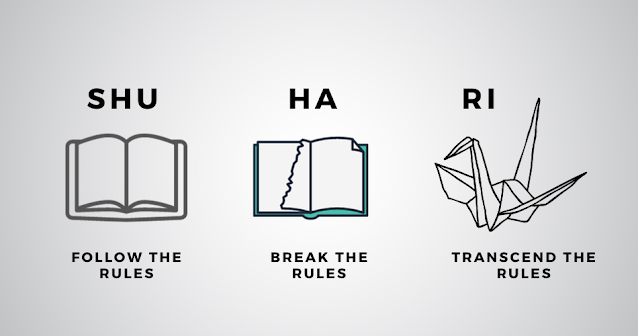SHU-HA-RI: The Pathway to Mastery in Modern Business
SHU-HA-RI: The Pathway to Mastery in Modern Business
The Path to Mastery in Modern Business: Embracing Shu Ha Ri
In today's rapidly evolving business landscape, the pursuit of mastery—in skills, processes, and strategic thinking—is not just an aspiration, but a necessity for survival and growth. While we often focus on the latest methodologies and technological advancements, there's profound wisdom to be gained from ancient concepts. One such concept, deeply rooted in Japanese martial arts and craftsmanship, is Shu Ha Ri (守破離). 🥋
Shu Ha Ri describes the three stages of learning on the path to mastery:
1. Shu (守 - "to protect," "to obey") - The Foundation of Discipline 🏗️
At the "Shu" stage, the learner diligently follows the teachings of their master without deviation. This involves:
- Strict Adherence to Fundamentals: Mastering the core techniques, rules, and best practices. In business, this means deeply understanding foundational principles like effective communication 🗣️, project management methodologies (e.g., Scrum, Kanban) 📊, financial literacy 💰, sales processes 📈, and customer service protocols 🤝.
- Replication and Imitation: Learning by doing exactly as instructed. For businesses, this translates to rigorously following established standard operating procedures (SOPs), implementing proven frameworks, and leveraging industry benchmarks.
- Building a Strong Base: This stage is about discipline, repetition, and absorbing existing knowledge. Without a solid "Shu" foundation, any attempts to innovate or break rules will likely lead to chaos and inefficiency.
In Modern Business: Think of new hires learning company policies, junior developers adhering to coding standards, or marketing teams following established brand guidelines. It's about building the fundamental muscle memory and understanding the 'why' behind existing best practices before attempting to change them. This stage is crucial for onboarding, training, and ensuring consistency. 🎯
2. Ha (破 - "to detach," "to break away") - Intelligent Experimentation and Adaptation 💡
Once the learner has fully internalized the "Shu" principles, they move to "Ha." This stage is about:
- Understanding the "Why" and "How": Beyond mere imitation, the learner now grasps the underlying principles and can discern when and how to apply or modify the rules. 🤔
- Intelligent Deviation: Experimenting with variations, adapting techniques to different situations, and integrating knowledge from other sources. This is where critical thinking truly comes into play. 🧠
- Questioning and Innovation (within bounds): Challenging existing norms not out of defiance, but from a place of deep understanding, seeking to improve and optimize. ✨
In Modern Business: This is where teams start to customize agile methodologies to better fit their specific projects, sales professionals adapt their pitch based on client needs, or product managers begin to iterate on existing features based on user feedback. It's about moving beyond rote execution to strategic application and finding more efficient or effective ways of working. This stage fosters creativity and problem-solving, leading to process improvements and incremental innovation. 📈
3. Ri (離 - "to separate," "to leave") - True Innovation and Independent Creation 🚀
"Ri" is the stage of true mastery. The learner has transcended the rules and can now create their own. They:
- Operate Beyond Formal Rules: The principles are so deeply ingrained that they can instinctively adapt, invent, and lead. They become the "master." 🌟
- Forge New Paths: Creating entirely new methodologies, strategies, or products that others will eventually learn from (and perhaps begin their own "Shu" journey with). 🛣️
- Intuitive Understanding: Their actions are guided by a profound, almost unconscious understanding of the domain. 🧘
In Modern Business: This is the realm of visionary leaders who redefine industries, disrupt markets with entirely new business models, or invent groundbreaking technologies. Think of companies that establish new categories, or individuals who become thought leaders, setting new standards for their field. These are the individuals and organizations that not only adapt to change but actively drive it. 🌐
Applying Shu Ha Ri to Your Business and Career:
- For Individuals: Are you in "Shu" mode, diligently learning the ropes? Are you in "Ha," experimenting and adapting? Or are you striving for "Ri," ready to innovate and lead? Self-awareness of your current stage is key to growth. 🌱
- For Teams and Organizations:
- Onboarding & Training: Emphasize "Shu" to ensure a strong foundation. 📚
- Process Improvement: Encourage "Ha" by empowering teams to experiment and refine existing processes. ⚙️
- Innovation & R&D: Foster "Ri" by creating environments where true breakthroughs can emerge, providing autonomy and resources for radical thinking. 🔬
- Leadership Development: Recognize that effective leaders guide their teams through these stages, providing the necessary structure at "Shu," encouraging intelligent exploration at "Ha," and fostering true innovation at "Ri." 👑
Embracing Shu Ha Ri isn't just about individual skill acquisition; it's a framework for organizational learning, continuous improvement, and sustainable innovation. By understanding and applying these three stages, businesses can cultivate a culture of mastery that propels them forward in an ever-competitive world. 🌍
#ShuHaRi #BusinessStrategy #LeadershipDevelopment #InnovationMindset #ContinuousLearning #OrganizationalGrowth #MasteryJourney #AgileMethodologies #CareerGrowth #SkillDevelopment #BusinessExcellence #StrategicThinking #ProfessionalDevelopment #TeamBuilding #FutureOfWork









Σχόλια
Δημοσίευση σχολίου